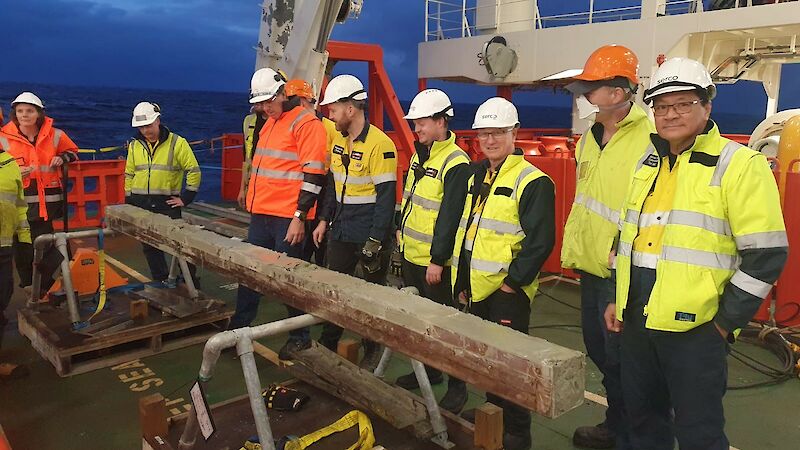Antarctic icebreaker RSV Nuyina is preparing for an ambitious marine science voyage early next year, with a range of science systems commissioning activities around southern Tasmania this winter.
Commissioning voyage leaders, Dr Imojen Pearce and Mr Steve Whiteside, are currently working with a team* of scientists, support personnel and crew from the Australian Antarctic Division, CSIRO, University of Tasmania and Serco, testing trawl deck systems and oceanographic equipment that will be used during the Denman Marine Voyage next March.
The Denman voyage will include studies on ocean chemistry and physics, and biological and sediment sampling, complementing a land-based campaign conducted earlier this year.
With these future activities in mind, the commissioning team is undertaking testing of, and training on, the ship's winches, the rectangular midwater trawl (RMT) net, a towed camera, the conductivity, temperature and depth (CTD) instrument, a range of sediment corers, and acoustic instruments.

Science project lead on board, Dr Elanor Bell, said these instruments were the 'work horses' of marine science.
"The RMT net can be opened and closed remotely, allowing us to capture krill, fish, or other marine creatures, in specific swarms or water layers," Dr Bell said.
"The towed camera captures video and images of seafloor features, and can help identify species and measure their abundance.
"And the CTD is used to collect water samples at different depths to investigate ocean chemistry, biology and temperature."
Dr Pearce said the ability to collect sediment cores, which help reconstruct past ocean conditions, is a new capability for the Australian Antarctic Division, supported by CSIRO, and an important part of the Denman Marine Voyage.
She said technical teams are also honing their skills on the ship's advanced acoustic sensor suite, including the multibeam echo sounders, which allow them to visualise the seafloor in great detail and target areas for instrument deployments.
"The commissioning team is doing a brilliant job utilising their already-significant practical skills and experience, while taking advantage of the opportunities to upskill and cross-skill," Dr Pearce said.
"The productive working relationship we have built with the Serco crew over the past 18 months is also paying dividends.
"We're having great conversations that are embedding processes and systems for the Denman Marine Voyage and beyond."
These conversations include fine-tuning standard operating procedures, safety checklists and other documentation developed over previous commissioning voyages.
The first commissioning voyage concludes on 23 June, with a second voyage running from 25 June to 11 July.
"These voyages are giving our science support teams a taste of being at sea for an extended period, which is important as we build towards the 60-day Denman Marine Voyage," Mr Whiteside said.
*These commissioning voyages build on the Centre for Antarctic and Southern Ocean Technology (CAST) collaboration between AAD, CSIRO and University of Tasmania. CAST aims to share knowledge and effort in engineering and technology innovation and development, to advance Antarctic and Southern Ocean research.






